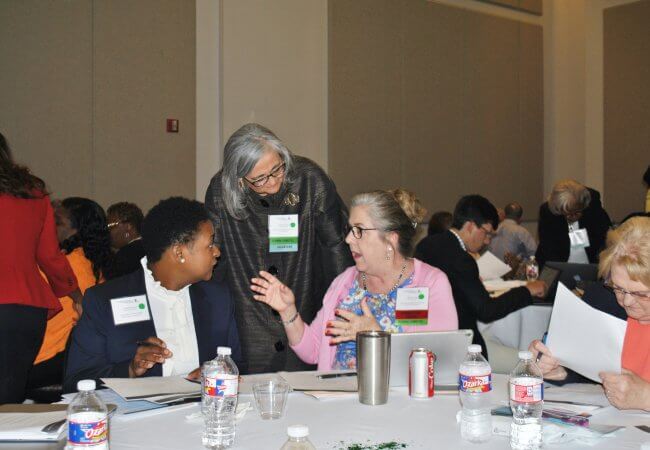
Jun 06, 2018
Health Disparities and Health Equity in Louisiana – Coming Together for Action

A diverse group of healthcare professionals, business, governmental and community leaders and other interested stakeholders from across the state gathered on April 5 in Baton Rouge to gain insight about the state of health of Louisianans and discuss ways to address major health disparities and promote health equity in the state.
“Where we live matters to our health,” said Julie Willems Van Dijk, PhD, RN, FAAN. Willems Van Dijk is Deputy Director for the Robert Wood Johnson-funded County Health Rankings & Roadmaps project at the University of Wisconsin Population Health Institute (www.countyhealthrankings.org). The annual County Health Rankings are based on health outcome measures related to length of life (50%) and quality of life (50%) and measures of health factors related to health behaviors (30%), clinical care (20%), social and economic factors (40%), and physical environment (10%). The findings are published each year and are used by organizations and communities across the country to devise ways to help close the health gaps between those with the most and least opportunities for good health.
Ashley Stewart, MPH, is Director of Programs for The Rapides Foundation. She attended the Summit and said, “All of the initiatives and programs developed by The Rapides Foundation are grounded in data about the region we serve, whether the program is to increase educational attainment or improve access to cancer screenings. We ask our grantees to justify the needs outlined in their proposals by providing data specific to their area and identifying evidence-based strategies for implementation. The County Health Rankings and Roadmaps website provides community members with a wealth of tools and resources that can help them address both of those areas.”
Prior to Willems Van Dijk’s presentation, Parham Jaberi, MD, MPH, Assistant Secretary for the Office of Public Health (OPH) at the Louisiana Department of Health, spoke to the group about OPH’s strategic priorities which included increasing immunization coverage amongst children and tackling the state’s high sexually transmitted infection and HIV rates.
Stephen F. Wright, Senior Vice President of Group Operations for CHRISTUS Health, addressed issues related to diversity and inclusion in our current healthcare system and shared strategies used within the CHRISTUS Health System to promote health equity. David Zuckerman, MPP, Director of the Healthcare Engagement Democracy Collaborative, presented community wealth building as a way to address health inequities.
Chaquetta Johnson, DNP, MPH, APRN, WHNP-BC, served on a four-person panel which discussed innovative programs in Louisiana that are aimed at building a culture of health. She said, “The 2018 Culture of Health Summit was outstanding! Last year’s event highlighted the challenges we face in our efforts to build a culture of health in our state and introduced community partners who were striving to overcome those barriers through partnership and collaboration. This year’s Summit went a step further to showcase healthcare champions who have developed programs that are moving us in the right direction. The diversity represented among the presenters, and in the audience, demonstrates how important building a culture of health is to improving the health and well-being of all citizens across the state.”
Other panel members included Jared Hymowitz, director of the Mayor’s Healthy BR initiative; Jeanne Solis, CCO with the Terrebonne Chamber of Health Leadership Alliance; and Charlotte Parent, BSN, RN, MHCM, Assistant Vice President, Community Affairs/Network Navigation, LCMC Health, BUILD Health Challenge.
Parent said, “The 2018 Culture of Health Summit provided a wonderful opportunity for nursing leaders to discuss the ways they are leading the charge for health equity and the limitless potential of partnerships to change the paradigm of health. The Louisiana Action Coalition provides the space for nurses to demonstrate how nursing can lead the charge.”
Building a Culture of Health is a movement led by the Robert Wood Johnson Foundation and shared with others to take on one of the most pervasive challenges of our time: improving the health and well-being of every one in America. A Culture of Health places well-being at the center of every aspect of life, so that all communities can flourish and all individuals thrive, regardless of race, creed, income, or location. It’s built on the premise that everyone deserves to live the healthiest life possible.
Cynthia Bienemy, PhD, RN, Director for the Louisiana Center for Nursing and LAC co-lead, was lead planner for the Summit. “We were very pleased with the attendance at the Summit and the engagement of the attendees,” she said. “The presenters challenged the audience to think beyond the clinical indicators of health and to focus more on the social determinants of health which tend to have a greater impact on health outcomes. If we are to address the disproportionate prevalence of healthcare disparities amongst those that are economically disadvantaged in our state we must change our way of thinking and doing.”
